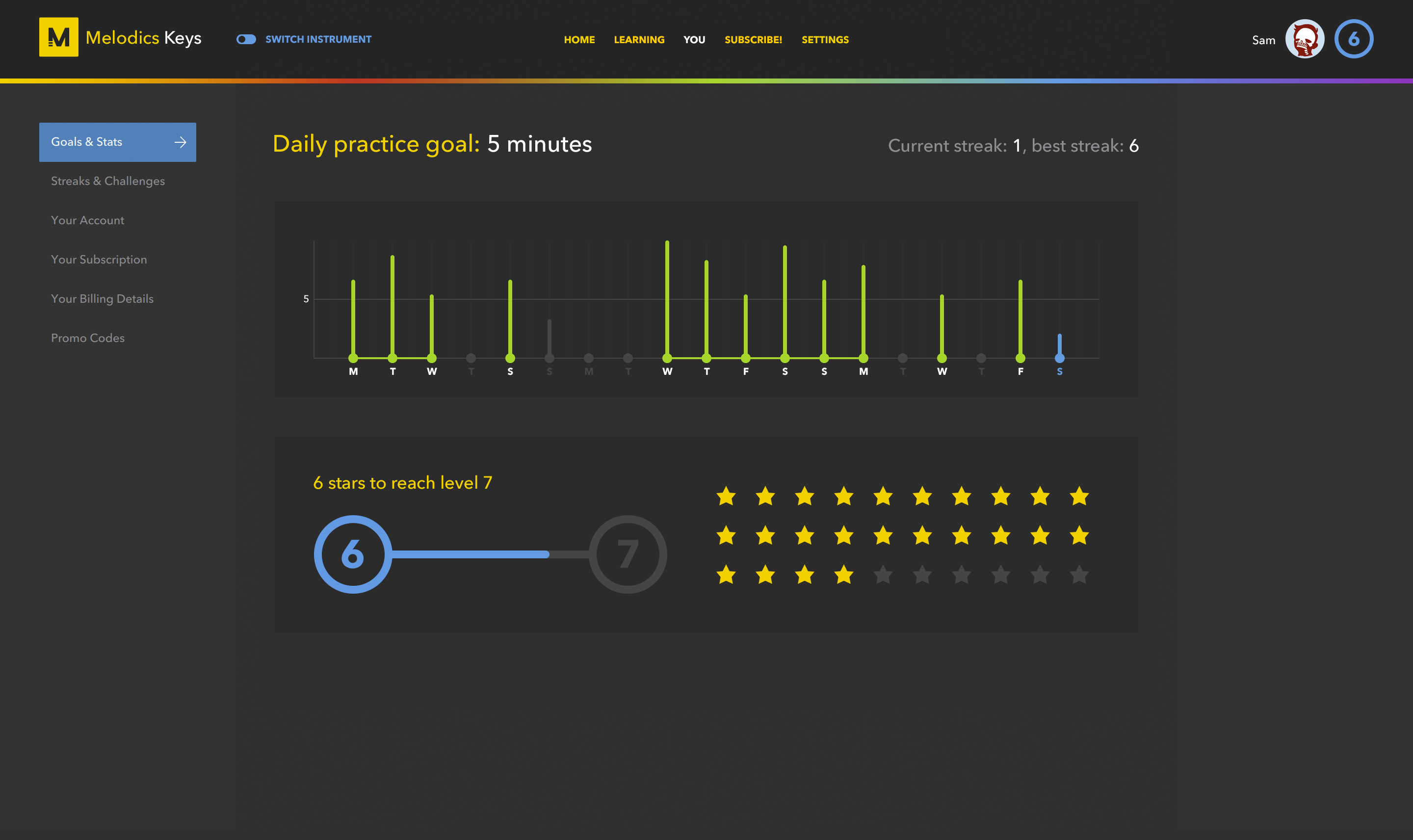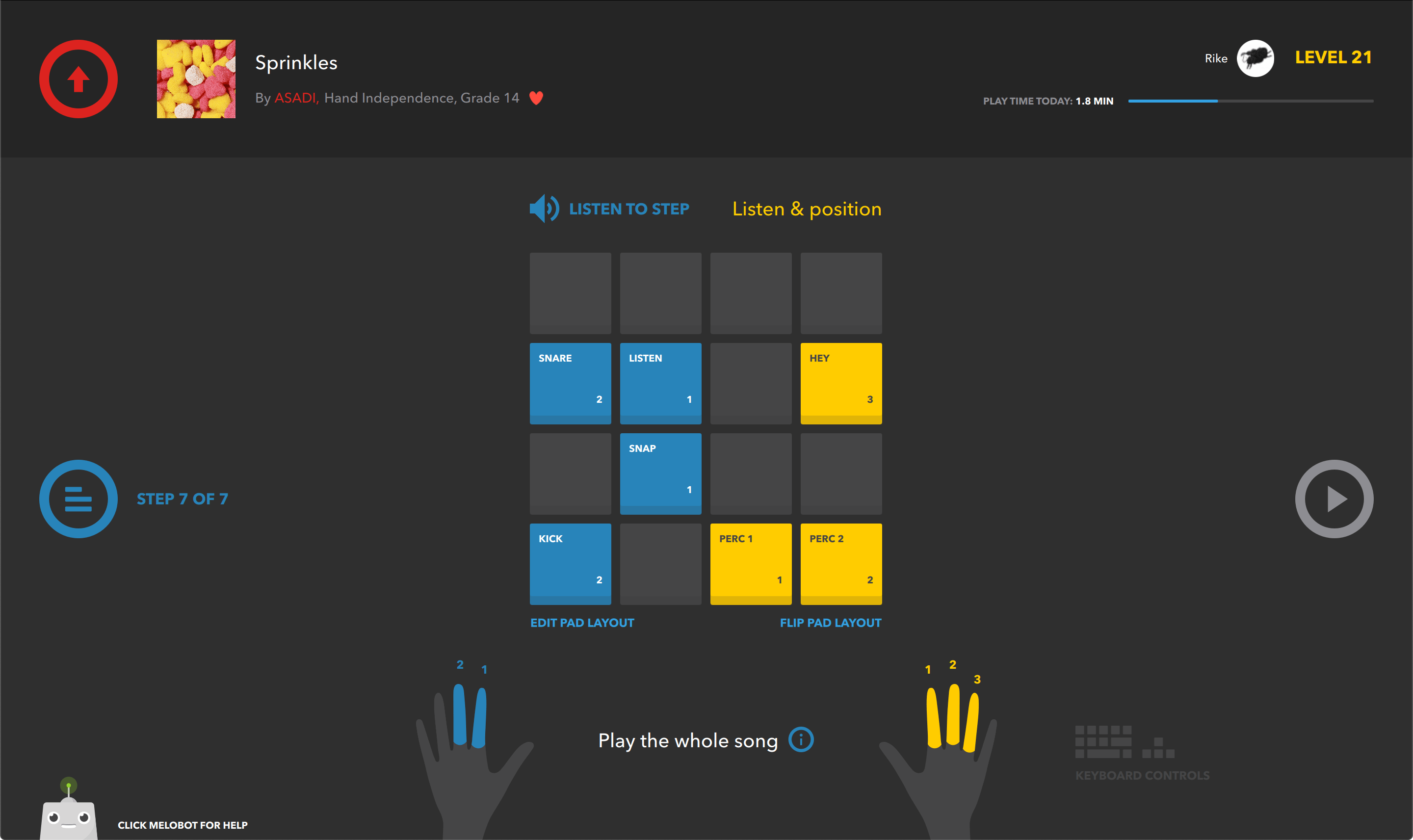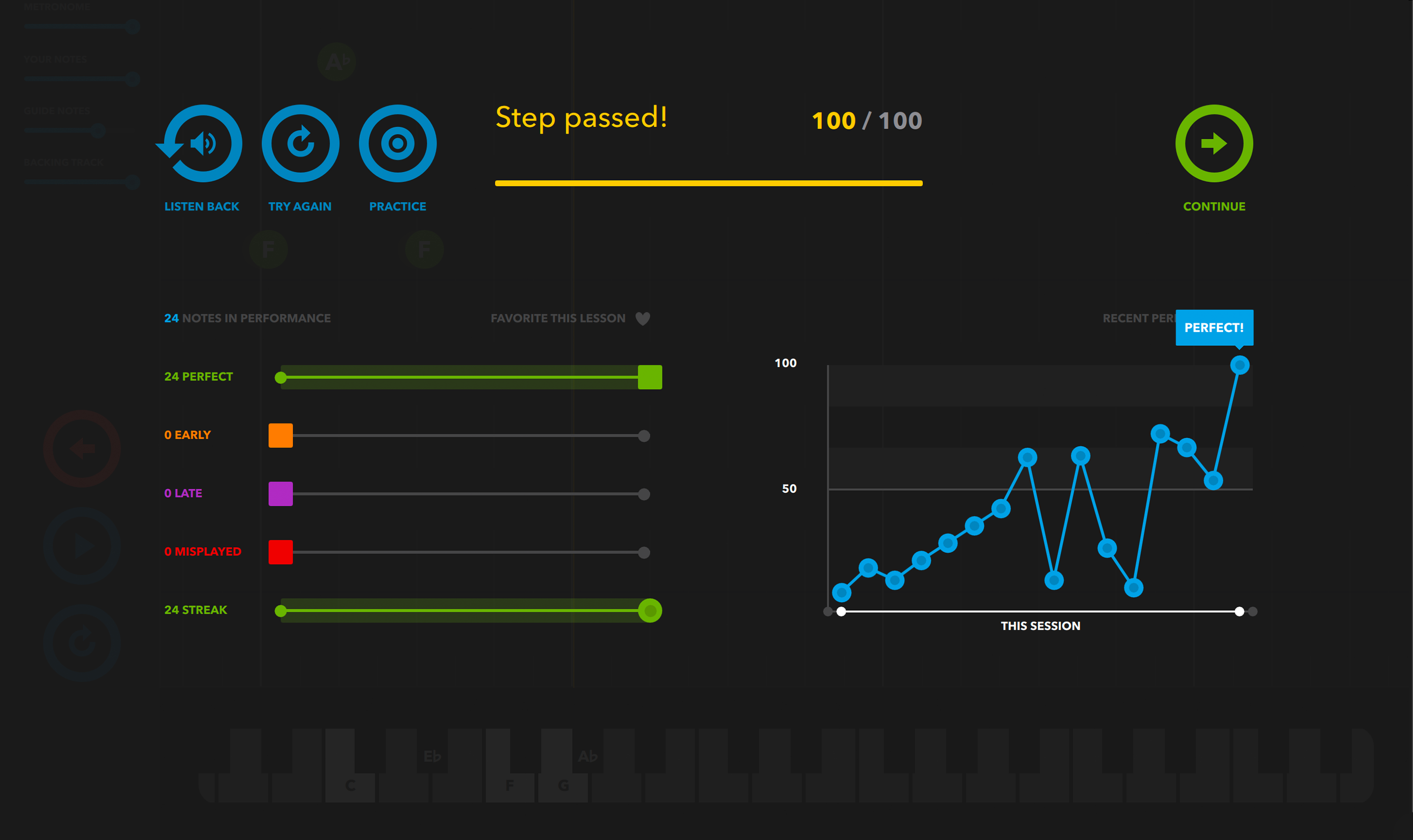Emergent genre + great music + adaptive learning
Playing drum beats on devices with pads has been around ever since there’s been devices with pads - from beginnings in the 80s with revolutionary products like Roger Linn’s LM-1 Drum Computer, to the heyday of the mighty MPC and it’s undeniable influence on hip hop and house production, to today’s incredible studio-in-a-box devices.
For producers, the ability to express yourself musically on one of these devices is essential - the ability to give a track feel, the x-factor that can lift it above a purely sequenced track. For DJs, cue point drumming (triggering & re-triggering different parts of a track using device pads) has become an important tool to add to their kit: hyping crowds and blowing minds worldwide.
But how does an aspiring artist learn how to do it? And once you can do it, how do you get better? How do you grow as a musician? We made Melodics™ to help.

Melodics™ daily practice goals.
Motivational mechanics, and the importance of practice
We kind of dislike the word practice, at least as it’s used musically. It raises images of endless scales tinked out an an untuned piano, aching hands trying to get the fingering right for an CMaj7#11 chord on the guitar. For many of us - brought up on hip hop / techno / jungle / EDM / a million other micro-genres, that approach didn’t fit with what we felt in the music. The energy. The fun.
So we did what worked. We embraced the tools available, and we did stuff until we got good at it. And although we wouldn’t have called it "practice" when we were doing it, that’s exactly what it was. With Melodics™ we wanted to replicate that approach, practicing and getting better while staying true to the fact that music is supposed to be fun.
Challenges
There’s two ways to Level up in Melodics™ - you can either earn enough points, or complete three challenges that we set you at each level. These challenges are designed to both motivate you, and to encourage you to explore different techniques, concepts, genres, etc. There’s a lot more to pad drumming than just drumming on pads! Musical concepts such as timing, tempo, hand / finger independence and time signature all play a part. Playing across different genres & styles of music introduces different ideas and approaches to those things, and helps you be a more well-rounded musician. The challenge system is designed to help guide you and help you to develop these techniques.
Practice goals
However you feel about “practice”, the fact of the matter is that it works. Repeating something over again is still the best way to get better at it, and that’s as true of learning to play music as it is anything else.
When you start playing Melodics™, you're presented with a number of practice goals to meet, which become increasingly harder over time. We've found that even with small practice sessions of just 5 minutes a day, your skills, timing & muscle memory will start to improve rapidly, and the practice goals motivate you to do that.
Adaptive learning and lesson suggestions
A big part of how we guide your experience is by suggesting lessons for you to play. When you first start, the suggestion engine mostly takes you through the basics, but as it learns more about your ability, musical tastes and strengths & weaknesses, suggestions become much more tailored to your individual preferences.
We launched with around 80 lessons, and are up to around 250 (with more being added every week), covering all skill levels and as many genres as we can cram in. Your suggested lesson path will be built especially for you, and expand as your abilities do.
Our approach to music education
We needed an expert in music education, so Melodics™ brought in David Lines, Associate Professor of Music Education and Deputy Head of the School of Music, University of Auckland.
There are several aspects of Melodics™ that David identified as being of particular interest to music educators:
- bringing the motivational psychology from gaming to learning to play an instrument
- focusing on practice, a major barrier for musicians at all levels - even at college level!
- the potential to improve the quality of instrumental music teaching

From the perspective of a music educator, Melodics is very interesting, and I’m excited to be working with them closely on the music education aspects of the product and the processes of music learning development. – David Lines, Associate Professor of Music Education at the School of Music, University of Auckland
David believes pad controllers are a great choice. “Learning to play any instrument requires a variety of skills - rhythm, coordination of hands and fingers, understanding of time signatures, use of attack and sustain, the list goes on. Pad controllers are a great way to build these skills.”
“Gameplay” & getting better
With Melodics™ we’re mixing two worlds - traditional audio software, familiar to thousands of DJs & producers, and an approach more like a game. At times it might feel like you’re playing a game, but with each session, you’re building muscle memory, improving your technique - getting better. Points, levels and challenges will be familiar to anyone who’s ever played a video game, but the amazing feeling of being able to put the Melodics™ software aside, focus on the pads in front of you, and play a beat you’ve just learned is undeniable. We’re bringing aspects of these two worlds together to create an experience that’s both educational, and super fun!

The Pads pre-play screen
Technique
Before each step in a lesson there’s a “pre-play” screen, which introduces what you will be playing, where on your device you’ll be playing it, and how to position your hands and fingers. Technique is a tricky thing with pad drumming. It can be very specific to the actual device being used, and there are many different pad layouts and configurations. We work with some of the best, lesson creators who are pioneers in the world of pad drumming. Their lessons capture years of practice and experimentation, their suggestions give you a massive head start for users new to the art.
Progress
It’s not easy to pass a lesson step in Melodics™, but it’s very rewarding when you do! The interface gives you feedback on how well you are playing - whether your pad hits are early, late, completely missed, or perfect - and every step requires a certain amount of accuracy to pass.
We find that when you are just starting out on your pad drumming journey, you tend to need to look at the controller much more than the interface, so on devices that support it we’ve implemented colour lighting on the pads to give feedback at your fingertips. As you get better at a step and get comfortable with the finger position, you can look up at the screen for a more detailed view.

The step complete screen
Rewards
Passing a step feels good, but completing a lesson feels great. At the end of each step you get a breakdown of how you did - how early / late your timing was, how far along you are toward your daily goal, and most importantly, whether or not you passed the step.
Once all steps are complete (or you can skip ahead steps if you’re feeling up to it), it’s time for the big one. The last step of every lesson is where you put everything you learned in to place, and take your shot at the full arrangement. How you score on the final step determines how many stars you receive for the lesson, so for those completists out there, you can always return to the lesson and try to 3-star it!
The goal
The goal? Get better. We want to help musicians get better at pad drumming, to make it part of their art. That may sound a bit high and mighty, but it’s true, and it’s why we created Melodics™. We hope you enjoy it!
About Melodics™
Melodics™ was conceived by Sam Gribben, Ex CEO of Serato, in the summer of 2014. Having finished up at Serato after a decade at the helm, Sam was ready for something new. He’d worked with some of the biggest artists in the music world, and with the international companies who built the instruments & controllers they used. Along the way he noticed how important pad & cue point drumming was becoming in the overlapping worlds of DJing & production. Thus, an idea was born.

I had drum machines and pad controllers for years, and it frustrated me how hard it was to learn new patterns and beats. I’ve watched tons of videos from expert finger drummers, but it always felt so hard to develop the dexterity and muscle memory you need. – Sam Gribben, Melodics CEO
Not one to leave an idea alone, Sam got busy. Sketches were sketched, a prototype was produced, contacts were contacted, and yep – it turns out it was a good idea. Things snowballed, as they tend to do, and in early 2015 Sam put a small team together, and work on Melodics™ began in earnest.
The result is the app you can download now. With several huge international artists on board, and more on the way; with over 100 lessons to play, and more coming every week; and with a team dedicated to helping you get better at pad drumming, Melodics™ is here. We hope you enjoy it, and we look forward to making it even better in the weeks, months, and years to come. Cheers!